Grit! – Wings Spring 2024
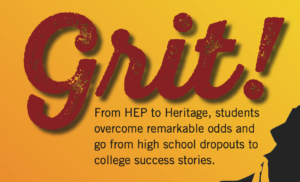
The path to college doesn’t always follow a straight line. Sometimes, promising students, those who are doing the work and bringing home good grades, hit road bumps that send them off track. That’s what happened to 24-year-old Brian Solano. He was a good kid who studied hard and dreamed of going to college. But during his senior year, crippling anxiety got the better of him. Racing thoughts kept him from paying attention in class. He started missing school, fell behind, and ended up dropping out of high school.
Other times, good people end up in unfortunate circumstances. This is 28-year-old Zachary Minthorn’s experience. He was born into a family where drug and alcohol addiction were pervasive. He was placed into foster care at seven and moved from place to place until he was 14 and returned to his family. His home situation hadn’t improved, and he began spending more and more time staying with friends. He was kicked out of his house at the beginning of his senior year. At 17 years old, he was homeless, couch surfing from place to place, and in full-on survival mode. He dropped out of high school and turned his attention toward finding work to support himself.
For every person who enrolls in Heritage University’s high school equivalency program, HEP Alliance (HEP), there are stories like Brian’s and Zach’s. Educations that were halted by decisions made to leave school, some for good reasons, others made with the mercuriality of youth. Regardless of the circumstances that led someone to drop out of high school, HEP is here to provide a second chance.
HEP Alliance is a federally funded program that helps students earn their High School Equivalency Diploma (HSED), commonly called a GED. The free program is open to students 16 years old or older who are assessed at or above the 9th-grade education level and from households where they or their family members have worked in migrant or seasonal farm work. This includes any activity related to fisheries, hunting, and the production of crops, dairy products, poultry, livestock or forestry.
When students enter the program, they are first given an assessment to determine their current academic level and how much instructional support they need. Classes are offered in either English or Spanish. Up to 80 hours of instruction is provided within four subject areas: language arts, social studies, sciences, and mathematics. The courses, materials, and one-on-one tutoring are all part of the program, which is funded by the U.S. Office of Education’s Office of Migrant Education (OME). Students who test high enough can opt to forgo any classes and go directly to taking the HSED exams.
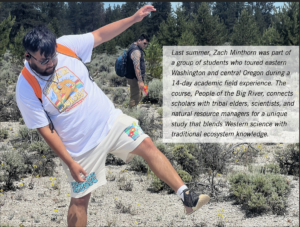 Heritage’s HEP Alliance has a remarkable success rate. Since its inception in 2004, roughly 3,000 students have earned their high school equivalent diploma. The number of students served each year fluctuates depending upon the grant parameters. Currently, it serves 100 students annually. Of these, 90% continued their education, enrolling in some form of postsecondary, technical or vocational schooling. What brings students to HEP Alliance is as varied as the people the program serves.
Heritage’s HEP Alliance has a remarkable success rate. Since its inception in 2004, roughly 3,000 students have earned their high school equivalent diploma. The number of students served each year fluctuates depending upon the grant parameters. Currently, it serves 100 students annually. Of these, 90% continued their education, enrolling in some form of postsecondary, technical or vocational schooling. What brings students to HEP Alliance is as varied as the people the program serves.
“We have students who are single mothers who want better employment and want to serve as role models for their kids. We’ve had unhoused students facing family and personal struggles who are seeking better opportunities. We serve regardless of an individual’s economics, culture, or language. We are here for all of them,” said Jennifer Renteria-Lopez, HEP Alliance program director.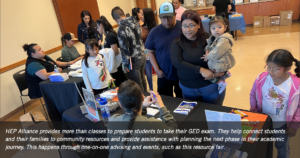
RESTARTING THE EDUCATIONAL DREAM – BRIAN’S STORY
Solano came to HEP three years after he dropped out of high school. He had been working in a video store and in the fields with his parents during the summer.
“I’d get up and go to work in the fields from 5:00 in the morning until 1:00 in the afternoon. Then I’d go home, shower and go to my other job at the video store,” he said.
Things were going well for Solano. He was getting help to manage his anxiety, and he liked his work at the video store. He knew he needed to get his GED and tried a couple of times, but it just never worked out. Then, he had a relapse with his anxiety, and he quit his job.
“In an odd way, I think that this relapse was a blessing,” he said.
Solano took some time off to concentrate on getting healthy. When he felt strong enough, he decided to try one more time to get his GED.
That is when he found his way to HEP Alliance. The program was only a few miles away from his home, and when he went in to get more information, he saw a familiar face. The older sister of his sister’s childhood friend was there. He immediately felt comfortable, and, with her help, he started the enrollment process. Solano aced the assessment test and could have immediately taken the HSED exam. But he elected to sit in on a few math courses first to refresh his memory. A few weeks later, he took and passed the exams. Solano was the proud recipient of a high school equivalency diploma.
FROM JUST SURVIVING TO THRIVING – ZACH’S STORY
There is no sugar-coating Minthorn’s origin story. He was born into the hopelessness of poverty and addiction and grew up in instability. School is far from being a priority when you are just trying to survive. He dropped out of high school at the start of his senior year.
Minthorn spent the next several years taking on odd jobs here and there and floating from couch to couch. One day, he ran into a childhood friend.
“His family had always been good to me,” he said. “His mom told me, ‘Come and fish for us.’ I took them up on their offer. I think that was when things started to change for me.”
Minthorn started to look beyond odd jobs and tried for more steady employment that could lead to a career. He began to train to be a mechanic, but his heart wasn’t in it. He spent some time working in security and eventually became a logger working for the Yakama Nation. While he liked logging initially, he began to get restless.
“It wasn’t fun doing the same thing every day. It was extremely physical work, and I didn’t feel like I was achieving anything,” he said. “I heard about people getting their GED, and based on that, they were able to get better jobs. They were no longer stuck.”
Minthorn found his way to HEP Alliance and had his high school equivalency diploma in less than a month.
FROM DROPOUT TO COLLEGE STUDENT
“The beauty of having a high school equivalency program tied to a university is how easily students can transition from earning their diploma to being enrolled in college,” said Renteria-Lopez. More than simply preparing students to pass the HSED exams, HEP counsels students and encourages them to think about what is next. Where they can, they help them with their transition to the next phase in their education.
“Students don’t always come to us with a plan,” said Renteria-Lopez. “Our program is a launching pad for our graduates. They come here and have some success, which encourages them to think bigger and do more.”
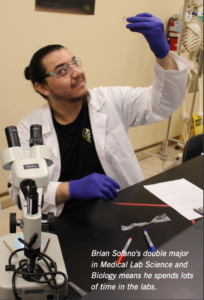 Solano and Minthorn both credit HEP for being the catalyst that got them enrolled in Heritage.
Solano and Minthorn both credit HEP for being the catalyst that got them enrolled in Heritage.
“When I started, my only goal was to get my GED,” said Minthorn. “Being here at Heritage is a direct result of coming to the HEP program and being told, ‘You’re ready to go to college.’ That wasn’t anything I ever thought of doing before.”
Solano, on the other hand, had always dreamed of going to college. Before things went south in high school, he planned to attend a major university and study agriculture. When he got his equivalent diploma, he knew that college was next.
“The lady I knew at HEP said, ‘You’re going to college, right?’ And I was like, ‘Yep!’” he said. “She suggested Heritage. She showed me the application and went over the majors that were offered. I saw the medical laboratory science (MLS) major and remembered how much I liked the medical biology class I took in high school. She walked me over to Admissions and I started the application process.”
Today, Solano is a junior double majoring in MLS and biology. He is an Eagles Scholar getting ready to enter his first summer research experience.
Minthorn is halfway through his sophomore year and is majoring in environmental science. In January, he was part of a team of students who traveled to South America for a research project at the Costa Rica International Research Experience. He was recently accepted into Heritage’s Crescent program, which provides mentorship and access to high-value research opportunities, and he is preparing for his first summer research project.
“I am still surprising myself,” said Minthorn. “I never saw myself as an academic. I never would have thought I’d be in college and have a GPA above 3.0.
“This whole experience, going to HEP, getting my GED, and coming to Heritage, has been life-changing. I went from being hopeless and having no faith or trust in anyone to being someone who isn’t afraid to lean on people and have trust in others. My entire perspective on life has changed.”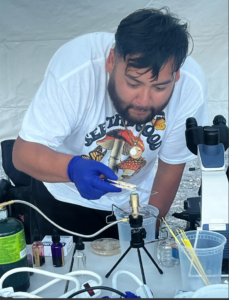
For both men, it is important that they stay in the Yakima Valley after they graduate and share their stories so that others can be inspired to make changes in their own lives.
“At the end of the day, I know that I’m not just doing this for myself; I’m doing it for my people, for all of us,” said Minthorn. “I know there are others out there with stories worse than mine. I hope those people can hear my story and say, ‘If he can do it, maybe I can too. Maybe it isn’t hopeless.’”
“I want people to know that no matter how old they are and no matter what they are doing, there is time to make a change, to get your GED, and earn a degree. I will be 26 years old when I graduate. I’m in classes with people well into their 30s and 40s,” said Solano. “It’s about buckling down and doing the work you need to do to get to where you want to go.”
Minthorn and Solano are prime examples of how important second chances can be for a person and a community.
“There is such a stigma associated with dropping out of high school. But, decisions made when someone is in their teens should not dictate the trajectory of the rest of their lives,” said Retineria-Lopez.
“HEP is about second chances. It’s about helping people reclaim their lives and build the opportunities they deserve. These students are among the most dedicated to their education. They understand what is at stake because they’ve lived so long with the struggle that not having a diploma brings them, and they are determined to do something different.They are all truly an inspiration.” ![]()
